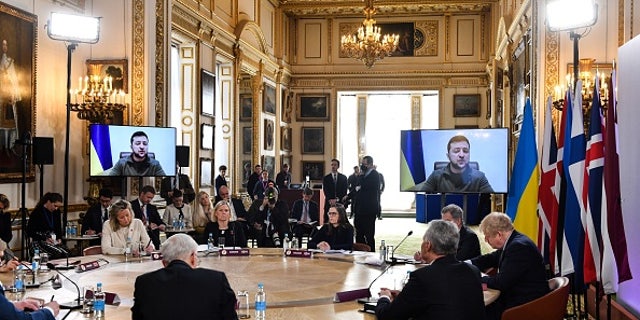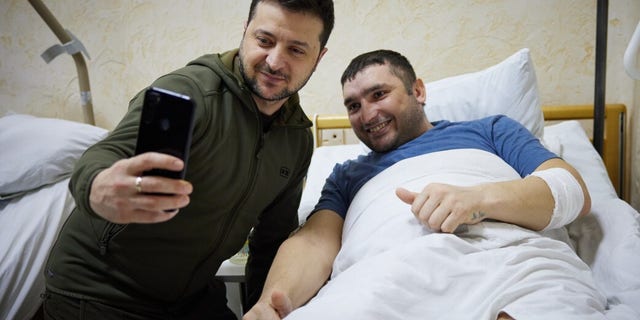Zelenskyy speech to Congress could be most important by a foreign leader since Churchill in 1941

Expect demands for supplies, no-fly zone in Zelenskyy’s address to Congress: Chad Pergram
Congressional correspondent Chad Pergram joins ‘America’s Newsroom’ to report on Ukrainian president Volodymyr Zelenskyy’s upcoming address to Congress.
Ukrainian Leader Volodymyr Zelenskyy won’t be the first world leader to speak to both the House and Senate when he speaks virtually tomorrow. But this could be the most any world leader has had on the line when they spoke to Congress in 81 years.
British Prime Minister Winston Churchill spoke to Congress on December 26, 1941 — weeks after the U.S. entered World War II following the bombing of Pearl Harbor.
Ukraine’s President Volodymyr Zelensky addresses by video link attendees at a meeting of the leaders of the Joint Expeditionary Force (JEF) at Lancaster House on March 15, 2022 in London.
(Photo by Justin Tallis – WPA Pool/Getty Images)
Churchill addressed lawmakers in the Senate chamber before movie cameras and added klieg lights. Multiple microphones from NBC, CBS and MBS (the Mutual Broadcasting System) sprang up in front of Churchill on the Senate dais.
It was a smaller gathering since some lawmakers had bolted Washington for the holidays. In fact, most Joint Meetings of Congress unfold in the House chamber. But Congress shifted the meeting to the Senate since the room is smaller and there wouldn’t be an embarrassment of open seats. All 96 Senate desks were filled with lawmakers, cabinet secretaries and Supreme Court justices.
The United Kingdom declared war on Nazi Germany in September 1939. So the U.K. had been at war for more than two years prior to the United States entering the fray in December 1941.
In a stark speech, Churchill predicted that allied powers would need a year-and-a-half before they could begin to see progress. Churchill also cautioned Americans about what was ahead as they joined the conflict. He said that “many disappointments and unpleasant surprises await us.”
Churchill warned those who would challenge the United Kingdom and the United States.
“What kind of a people do they think we are? Is it possible that they do not realize that we shall never cease to persevere against them until they have been taught a lesson which they and the world will never forget?,” asked Churchill in the Senate chamber. He questioned if “wicked men” didn’t know “they will be called to terrible account if they cannot beat down by force of arms the people they have assailed.”
Churchill returned for another speech to a Joint Meeting of Congress in 1943.
Tomorrow is not a Joint Meeting of Congress. But other global figures have spoken to Joint Meetings of Congress before at times of international crisis and amid war. Some have made appeals for more involvement by the United States in their conflict. When asked by Fox this afternoon, Senate Minority Leader Mitch McConnell (R-KY) again ruled a no-fly zone off the table, something Zelenskyy has pushed and requested of the Canadians.
Ukrainian President Vladimir Zelenskiy takes a photo with a wounded soldier by Russian attacks on Ukraine during his hospital visit in Kyiv, Ukraine on March 13, 2022.
(Photo by Ukrainian Presidency/Anadolu Agency via Getty Images)
Some other examples of foreign leaders addressing Congress at a time of war include:
French Premier Paul Reynaud spoke to a Joint Session of Congress in June 1940. France entered the war against Nazi Germany the year before.
South Vietnamese President Ngo Dingh Diem did so in May 1957 — and pleaded for more financial aid to fight the spread of communism in southeast Asia.
CLICK HERE TO GET THE FOX NEWS APP
Afghan Prime Minister Hamid Karzai spoke to a Joint Meeting of Congress in June 2004, as the U.S. still fought in Afghanistan following 9/11.
Former Ukrainian Leader Petro Poroshenko spoke to a Joint Meeting of Congress in September 2014, just after Russia annexed Crimea.
Source: Read Full Article



